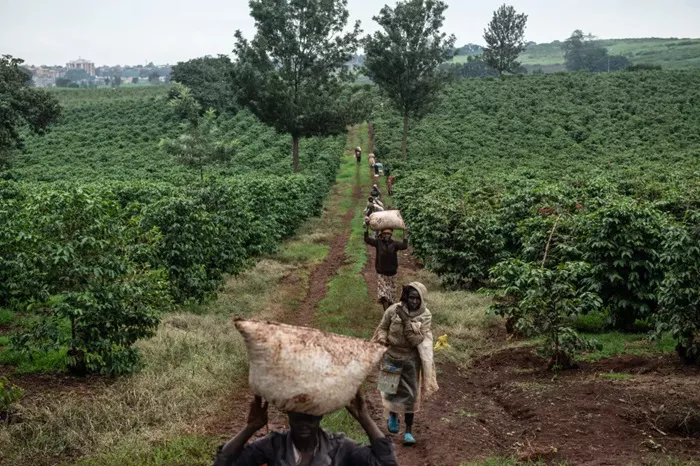A coffee bean‘s journey from remote farms to global markets is shrouded in mystery, transforming from an agricultural product into a commodity as it undergoes grading and standardization. This complex process, often opaque, has prompted the European Union (EU) to seek greater transparency. Echoing the sentiments of 19th-century Dutch novelist Eduard Douwes Dekker, known as Multatuli, who critiqued colonial trade practices in his work Max Havelaar, the EU now aims to uncover the intricacies of coffee and cocoa production.
Under its ambitious Deforestation Regulation (EUDR), set to be enforced by the end of 2025, the EU requires companies importing coffee, cocoa, rubber, soy, beef, palm oil, and timber to trace the origins of these commodities back to the farms where they were grown. This regulation necessitates the geolocation of millions of farms across various continents, marking a significant shift in how agricultural products are sourced.
The EUDR will not only track commodities but also reshape the agricultural landscape, influencing the practices of multinational buyers and altering workflows at rural processing stations. The challenges of implementing traceability are particularly pronounced for coffee and cocoa, especially in Africa, where these crops are predominantly cultivated by smallholder farmers rather than large commercial plantations. While this new traceability requirement may threaten access to European markets for some African growers, it also presents an opportunity for them to leverage their products in a more transparent market.
As one of the largest consumers of tropical commodities, the EU imports approximately one-third of the world’s coffee and half of its cocoa. Consequently, EU regulations can significantly impact farmers worldwide. The EUDR specifically prohibits the import of seven forest-related commodities cultivated on land that has been deforested since 2020. A nonprofit organization, Trase, estimates that EU imports of these commodities contributed to the loss of 736 square miles of forest annually between 2019 and 2021—an area more than ten times the size of Brussels. Cocoa accounts for about 34% of this deforestation, followed by palm oil at 19% and coffee at 13%.
To comply with the EUDR, importers must provide geolocation data indicating the origins of their goods—specific coordinates for small farms and larger geographical polygons for commercial farms. This information can then be cross-referenced with satellite imagery to verify land use changes, even if the land was legally deforested under national laws. Violations of the regulation may result in fines of up to 4% of a company’s EU turnover, aligning with the EU’s goal to achieve carbon neutrality by 2050.
Initially scheduled to take effect at the end of this year, the regulation faced criticism for its unrealistic timeline from industry groups, the United States, and several countries in the Global South, as well as many EU member states. In early October, the European Commission proposed extending the preparation period to the end of 2025, a recommendation currently under review by the European Parliament and Council.
SEATINI, a Ugandan NGO focused on trade, welcomed the postponement, viewing it as “good news.” However, this delay has raised concerns among environmental campaigners. Human Rights Watch criticized it as detrimental to forests and the rights of local populations. A representative from Fern, a nonprofit organization, accused the commission of yielding to pressure from businesses and nations that had long been aware of the impending regulation but failed to prepare adequately. Conversely, major chocolate companies like Nestlé and Mars Wrigley argue that a delay jeopardizes their investments in compliance.
Despite the timeline uncertainties, the push for traceability is inevitable. In rural Africa, which supplies approximately 85% of the EU’s cocoa imports and 13% of its coffee, this regulatory shift marks a critical change. Many multinational buyers remain unaware of the specific locations where their goods are produced.
Historically, the lack of profitability in traceability, except for specialty products that command higher prices, has hindered its adoption. Additionally, many African governments struggle with inadequate land ownership records and challenges in curbing the smuggling of cash crops across borders.
The broader context includes a legacy of reform that has transformed the trade of cash crops in Africa. Following World War II, states established marketing boards to regulate the export of crops like cocoa and coffee, but these often poorly managed entities limited farmers’ earnings. The dismantling of this system in the 1980s and 1990s, often driven by the International Monetary Fund and the World Bank, has left various countries with differing degrees of reform—some like Ghana cautiously preserving elements of the marketing boards, while others like Uganda fully embraced a free-market approach.
Related Topics:
FTC Takes Aim at Qargo Coffee: Franchise Violations Uncovered
Elevate Your Talent Game: Exclusive GCI Conference in London
Costa Coffee Faces £9.6 Million Loss Amid Rising Costs


